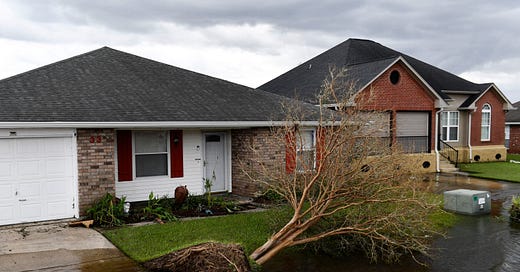
Skirting Ida
We’re exhausted with the weather. Our backs ache from lugging sandbags and moving furniture. Why do we live in this crazy place?

Just as we finish repairing the damage to our home from last October’s Hurricane Zeta, my husband and I board up and sandbag for Ida. We have plenty of water, food, batteries, flashlights, gas for the generator and the car. For 48 hours, we move furniture and computers away from windows, roll up rugs and place towels under the windows and doors.
Saturday evening, while gulls fly with the bats, we even relax and ride our bikes around town, taking before-Ida pictures to post on social media, telling friends that for Mississippians, Ida would just be a tropical storm, and we’re staying put.
Six years ago, we moved to Pass Christian, a beautiful coastal town that Hurricane Katrina mostly destroyed in 2005.
Nothing is good when it comes to hurricanes, but hurricane season is when coastal communities come together. We help each other. And in a divided, COVID-sick South, kindness is a welcome distraction.
But, late Saturday night right before we go to bed, the hurricane quickly shifts course east towards Mississippi, going from a Category 2 to a 4. The tone in the TV newscasters’ voices shifts, too.
We have our hurricane kit with important papers, granola bars, can opener, peanut butter, and toilet paper, but it’s strange and nonsensical what you choose to throw in a car at midnight.
I grab a favorite painting, my computer, purse, embroidery, a first edition of Eudora Welty’s Optimist’s Daughter, instant coffee, a bag of muffins, my grandmother’s pearls, and a bag of paperclips. Then I pack an ice chest full of gumbo. My husband packs his documentary film footage, some shorts, t-shirts, and boots.
The roads are clear as we head north in the dark. Our plan is to go to a friend’s house outside of Jackson, but that’s where Ida’s headed, too. We decide it’s safer to drive east into Alabama.
As we near a town, we call hotels. They’re all booked with hurricane evacuees from Louisiana. In Montgomery, we luck out. One last room at a Holiday Inn Express, where, at 4 a.m., we pull into a packed parking lot.
Safe, sort of. Inside, some evacuees are milling around, sleepless and without masks.
Late the following morning, we doom-scroll through Twitter for Ida news, discovering that even a hurricane can be political. QAnon conspiracy theorists tweet that Ida is man-made. They cheer for the destruction of New Orleans.
We check the TV. Ida is wreaking havoc in New Orleans and it’s on its way to Pass Christian.
In downtown Montgomery, we walk around in the rain, stopping for coffee at a hip coffee shop and community center. We read plaques honoring Rosa Parks, then tour a small, Hank Williams museum with Williams’s old dinette set, cowboy suits, and boots. For a long while, we stand in front of his blue Cadillac convertible, where he died in the back seat of a heart attack. In 1953, he’d been on his way to a performance, and had hired a college kid to drive him because of a threatening ice storm.
Back at the hotel, we check the weather again before we go to bed. Our friends in Pass Christian are in for a terrifying night of howling winds and tornado warning sirens. It’s strange to wish we were there, riding it out with them.
Ida is a different kind of hurricane, not only because of its sudden change in strength, but because of how some people are reacting. Monday morning, we watch NBC correspondent Shaquille Brewster reporting live from a Gulfport beach when a pickup truck drives up behind him. A white man jumps out, runs toward him, shouting “cover this accurately,” and lunges at Brewster, who is black. Brewster cuts to a newscaster who says there’s a lot of crazy out there.
The Memorial for Peace and Justice is closed, so we head back home early, even though it might be too soon. We drive through a rainy outer band, wipers at full tilt and hazards blinking, slowing at tornado warnings as we cross Little Lizard Creek near Satsuma and Chickasaw.
A neighbor sends a picture of our house, saying it looks okay. We can’t believe it.
When we get there, Pass Christian in general looks okay, too. Some fences and shutters are down, but nothing like the aftermath of Zeta. The book store reopens that afternoon. So does the Waffle House.
Back at our house, we survey the damage. A few shingles have blown off the roof, but nothing that can’t be fixed. Our Louisiana neighbors weren’t as lucky.
We’re exhausted with the weather. Our backs ache from lugging sandbags and moving furniture. Why do we live in this crazy place?
In his book Freedom, Sebastian Junger writes about how nomads are not bound by fixed areas, how they move without difficulty, often at a moment’s notice. This is a form of freedom.
Sometimes, neither one of us wants the burden of a home, but we are tied to this place whether we want to be or not.
I check our community Facebook page, scrolling through funny posts about hurricane food and updates on neighborhood flooding bringing unwanted visitors—alligators.
I read an alert that the Gulfport police need help identifying the white man who harassed Shaquille Brewster on the beach. There’s a follow-up post. The man has been identified—his truck has Ohio license plates.
We open the shutters and begin to put our house back in order. Newscasters shift from talk of Ida back to Afghanistan.
There’s a text from a neighbor asking if we need any help and a message that a guy’s coming over to fix the roof tomorrow. We invite New Orleans friends without power or water to come stay with us.
Tonight, we’ll have gumbo.









